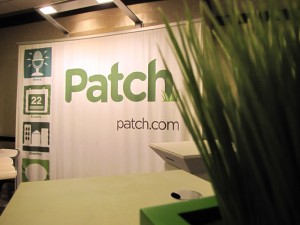
The Patch.com booth is at the entrance to the vendors exhibition area at ONA10. Photo by Lauren Slavin/Towson University.
As attendees of the Online News Association Conference ate and listened to America Online’s Tim Armstrong talk about the roots of AOL’s fast-growing, hyperlocal website Patch.com, comments began brewing. It was time for the audience to have a say.
Those brave enough to take a mic tiptoed around the question Robert Hernandez said he knew was on everyone’s mind. He said he just decided to be the sucker who said it.
“Is Patch evil?” Hernandez asked.
The question was met with applause, but also an earnest response from Armstrong.
“If you think it’s evil, put on your consumer hat for a minute,” Armstrong said. “What’s the consumer in your town doing, and are you satisfying (his or her needs)?”
Armstrong appeared in a keynote presentation with National Public Radio’s Vivian Schiller. Kara Swisher of All Things Digital moderated the event.
Their appearance drew a standing-room only crowd eager to learn about media reincarnation. A 2009 startup that wasn’t even a part of ONA last year, Patch hopes to have 500 functional sites by the end of the year.
They’ve started such programs as PatchU, a partnership with universities to gather content, and worked with the Knight Foundation to start Patches in underserved communities.
“We’re bringing communities together, giving them valuable news and information,” said Lindsay Deak Friedman, manager of recruitment operations and programs for Patch. “Our editors live and operate in the area they cover, so they’re very much a part of that fabric, that patchwork, so to speak.”
Patch has traveled with ONA members since registration, from the logo on the tote bag handed out the first day to passing by the Patch vendor booth across from the registration desk.
Patches are spreading across the country, offering jobs in an era where finding work as a journalist has been difficult. Patch has been criticized for long hours and low pay. Armstrong said the majority of new Patch editors are making the same or more than they did in their previous job.
While admitting the Patch editors are being “worked to death,” Armstrong said it comes with the territory.
“If you don’t want to work hard, this is not the industry for you to be in,” he said.
At the Patch booth, Lauren Novak, recruiter for Northeast editorial side for Patch, elaborated.
“People are really excited about what we’re doing because we’re actually hiring so many people” at a time when the news industry, especially print, is contracting, she said.
“We’re giving so much opportunity to those who maybe went into journalism and were starting to wonder if that was the wise choice,” she added.
One of those journalists is George Washington University senior Heather Hodder, who freelances for the Georgetown Patch here in Washington, D.C., and spent her summer writing for the Livingston, N.J., Patch.
“I wanted a summer job that wasn’t too full time, and it was a great opportunity to cover stories, work in journalism, but go to school because I had summer classes,” she said.
Patch works to pair less-experienced journalists with veterans of the field, Novak said. The new graduates have the knowledge of the digital aspects of working on a completely online news source, while the seasoned journalists have years of experience in multiple fields to share.
“I think both have the opportunity to learn from one another,” Novak said.
The new opportunities Patch brings cannot mask the concerns of the journalism community. After asking his bold question, many audience members approached Hernandez to shake his hand and even hug him for saying what was on their mind. After the keynote, Hernadez said while “Is Patch evil?” is one of the first five questions he hears when engaging with other conference attendees, he recognizes it as a question and not a judgment.
“It’s great to see an investment in journalism, but a lot of folks don’t know what the business plan is or what the big strategy is,” Hernandez said.
Armstrong compared AOL to the Disney corporation, which has multiple brands, a reputation for quality and an ability to build a good relationship with consumers. Treating employees with respect is one part of the equation. Having a good relationship with the communities they cover is the second part, as they are creating content users trust about news the consumer wants.
A member of the audience asked if Patch would crush local news blogs that are already thriving in many communities. Armstrong said Patch wants to be a good community citizen and actually hopes to collaborate with those sites.
“Competition is not evil,” Armstrong said. “We never would have started Patch to have that (reputation).”
